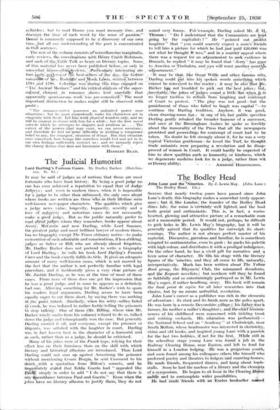The Judicial Humorist
IT may be said of judges as of nations that those are most fortunate who have. least history. By being a .good judge no one has ever achieved a l'eputation to. equal That of Judge Jeffreys ; and even in modern times, when it is impossible for a judge to be other than nnbiassed, the only, ones aboUt far books are written-are thOse -*UM their lifetime-Were well-known newspaper characters. The qualities. which give a judge news value, longevity, loquacity, severity and a love of notoriety and notorious cases do net necessarily make a good. judge... But _as the .public .naturally. prefer to read ttig)(it--jutges whom they remember,-book-s- appear-about Avory, lifetardie and now Darling, while LordSumner, the- greatest judge and most brilliant lawyer of modern times, has no biography except The Times obituary notice—to mak. no nention of such admirable and conscientious, if less.striking, judges as Salter or Hill, who are already alMosf foigOtteri. Mr. Dudley Barker does not pretend to write a -biography of Lerd Darling : he -calls his book. Lind Being's Famohs eases and the book exactly fulfils its title. It gives an adequate account of many well-known cases, which is not marred by the fact that the author is not perfectly familiar with legal procedure, and it incidentally ?gives a very. clear picture of Mr. Jtistice- Darling, as he was at the .time-of most of. these cases. From none of them does one get the impression that he was a great judge, and in some he appears as a definitely bad one. Allowing something for Mr. Barker's wish to spare his readers legal arguments, Darling- seems to have- been equally eager to cut them short, by saying there was nothing itt'?the point Tatted: .whert his witty: sallies failed ti) crush, he was-redueed to rather feeblYltellingthe prisoners ib "sthp tine ofthem (Mr. Billing, whose vitae-ME. Barker wisely omits from -his volume) refused to do so, talked- down the judge and triumphantly won the case. But generally Darling carried it off, and everyone, except the prisoner or litigants, was satisfied with the laughter in court. Darling was in fact known best in the character of a humorist and is' such, rather than as a judge, he should be criticised.
Many of his jokes were of the Punch type, relying .for their effect less on their funniness than on the skill with which literary and historic-al gllusiOns are-introduced. Thds Lord Darling could not, sum up-against Armstrong the poisoner without mentioning Cesare Borgia, he sent Casement to his detith.‘,with a--quotation .from Milton'S sonnets, and• he inaseurately staXed that Eddie Guerin . had " appealed, like rat simply in order to add " I do not say that there is any ttsemblance between Paul and Guerin.." Even when. Vic. jokes have no literary allusion "to justify thein,--they de. not Soluid very. funny:: roVsexample, Darling asked Mr. Thomas-: '" Do I understand that the Communists are tiePt going 'by- the Capitalists ? " He " pointed out lirildst laughter. " that " you could scarcely expect a man's- friends to tell him a picture for which he had just 'paid £20,000 was not what he-thought Ir was," and in a murder' appeal where there was a request fdi an adjournment to seek evidence in
Brussels, he replied " it may be found that ' Jerry has to America or Timbuktu, and you will want another mont ,:".adjourninent."' -It May be that, like Oscar Wilde and other famMis wits, Darling could put into hit Spoken words seMety which -" if
eannot be 'eons to the7reader ; • it may be AO at yr.
Barker -144 not 'troubled- to pick out the'-best jokes; b4,
Itnevitabl3F,1the jokes- of-judges soUnd.a, little =fiat::whe is no longer tactless to refrain 'from laughing and contempt of Court to protest. " The play was not good—but the punishment of those who failed' to laugh was capital "—to continue the Darling tradition. Anyhow, it was good, clean. drawing-room fart ; in one of his test public speeches Darling gently rebuked the broader -humour of a successor, and once at the Biriningham AssizeS he spoke so forcibly about the immorality of the Press that all the newspapers protetted and proceedings for contempt of court had to be taken. No doubt he felt strongly about it, for he was a very typical Victorian gentleman—he loved the Turf, he thought trade unionists were preparing a_revolution and he disap- proved of women in Court. It could hardly be expected of him to. show qualities ,tte.11 as humanity or skindness, which we degenerate moderns look for.. in a. judge, rather than wit
AAIBBOBC HOOPINGTON.


















































 Previous page
Previous page